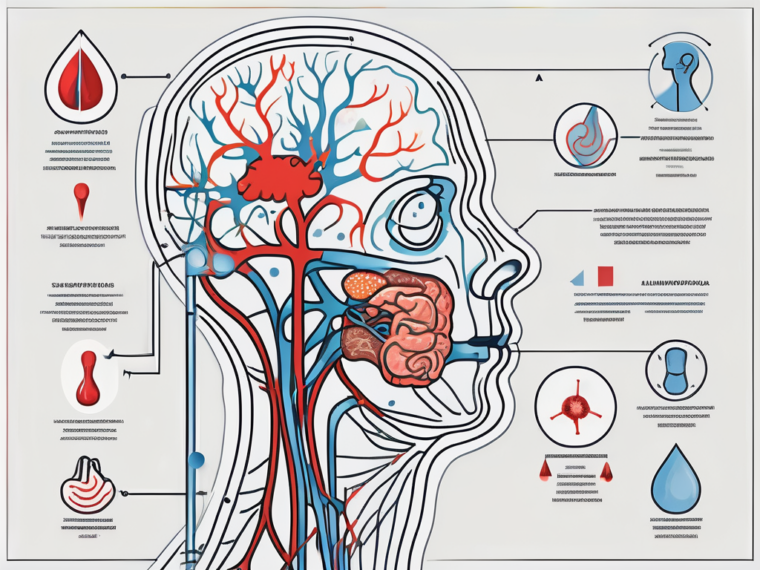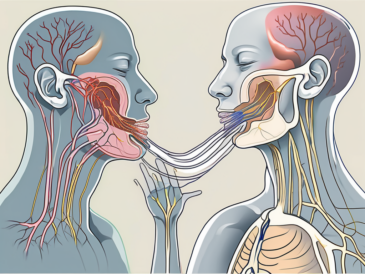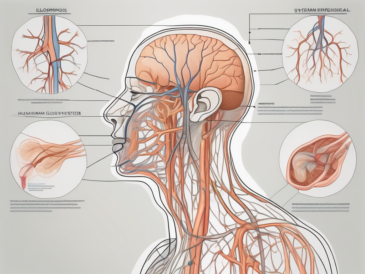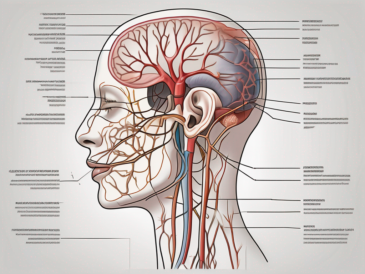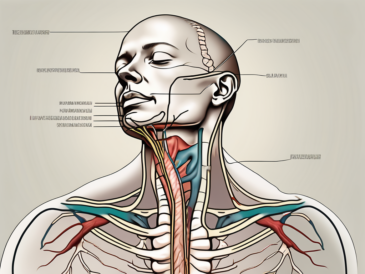The glossopharyngeal nerve is a crucial cranial nerve responsible for various functions in the body. Damage to this nerve can result in a range of symptoms and potential complications. Understanding the signs of glossopharyngeal nerve damage and its potential consequences is essential for timely diagnosis and appropriate management.
Understanding the Glossopharyngeal Nerve
The glossopharyngeal nerve is the ninth cranial nerve and primarily innervates structures in the head and neck region. It originates in the medulla oblongata, a vital part of the brainstem responsible for controlling various autonomic functions. The glossopharyngeal nerve’s branches extend throughout the throat, tongue, and ear, making it a crucial component of our sensory and motor systems.
As one of the cranial nerves, the glossopharyngeal nerve is part of the peripheral nervous system, connecting the brain to the rest of the body. It is named after its two main regions of innervation: the glossus, which refers to the tongue, and the pharynx, which refers to the throat. This nerve plays a significant role in numerous vital functions, including swallowing, speech, taste, and sensation in the upper throat and posterior third of the tongue.
Anatomy of the Glossopharyngeal Nerve
The glossopharyngeal nerve consists of motor and sensory fibers, each serving distinct purposes in the body. The motor fibers control the function of specific muscles involved in swallowing, allowing for the coordinated movement of food and liquids from the mouth to the throat and esophagus. These motor fibers ensure that the intricate process of swallowing occurs smoothly and efficiently.
On the other hand, the sensory fibers of the glossopharyngeal nerve transmit information related to taste and sensation. These fibers carry taste signals from the posterior third of the tongue, allowing us to experience the sensations of sweet, sour, salty, and bitter. Without the glossopharyngeal nerve, our ability to savor and enjoy different flavors would be greatly diminished.
In addition to taste, the glossopharyngeal nerve provides sensory information from the back of the throat. This allows us to detect discomfort, pain, and potential threats in this area. The nerve acts as a warning system, alerting us to any abnormalities or dangers that may arise in the throat region.
The glossopharyngeal nerve extends from the brainstem down to the throat region, where it branches out into different paths to carry out its various functions. These branches ensure that the nerve’s signals reach the appropriate destinations, enabling the intricate coordination required for tasks such as swallowing and taste perception.
Function of the Glossopharyngeal Nerve
The primary functions of the glossopharyngeal nerve are diverse and essential for our daily lives:
- Swallowing: The glossopharyngeal nerve is responsible for coordinating the complex process of swallowing. It helps in controlling the muscles involved in the movement of food and liquids from the mouth to the throat and esophagus. Without this nerve’s precise control, the act of swallowing would be challenging and potentially hazardous.
- Taste Sensation: This nerve carries taste signals from the posterior third of the tongue, allowing us to experience the sensations of sweet, sour, salty, and bitter. It is through the glossopharyngeal nerve that we can fully appreciate the diverse flavors of the foods we consume.
- Sensation in the Throat: The glossopharyngeal nerve provides sensory information from the back of the throat, helping us detect discomfort, pain, and potential threats. This crucial function allows us to respond appropriately to any issues that may arise in the throat region, ensuring our well-being and safety.
Identifying Damage to the Glossopharyngeal Nerve
Damage to the glossopharyngeal nerve can occur due to various reasons, including trauma, infections, or underlying medical conditions. Recognizing the signs of nerve damage is crucial for prompt diagnosis and treatment. Common symptoms of glossopharyngeal nerve damage include:
Common Symptoms of Glossopharyngeal Nerve Damage
- Difficulty swallowing: Patients with glossopharyngeal nerve damage may experience difficulties in swallowing food or liquids, leading to choking episodes or persistent feelings of obstruction.
- Changes in taste sensation: Damage to the glossopharyngeal nerve can result in altered taste perception or complete loss of taste on the back of the tongue.
- Throat pain and discomfort: Nerve damage may cause persistent pain, discomfort, or a sensation of a lump in the throat.
- Impaired speech: Some individuals may experience changes in articulation, voice quality, or speech clarity due to glossopharyngeal nerve damage.
If you suspect glossopharyngeal nerve damage, it is imperative to consult a healthcare professional for an accurate diagnosis. Diagnostic procedures may include a thorough medical history assessment, physical examination, and potentially further investigations, such as imaging studies or electrophysiological tests.
Glossopharyngeal nerve damage can be caused by a variety of factors. Trauma, such as a car accident or a fall, can result in injury to the nerve. Infections, such as strep throat or tonsillitis, can also lead to damage. Additionally, certain medical conditions, such as tumors or neurological disorders, may affect the glossopharyngeal nerve.
Difficulty swallowing is a common symptom of glossopharyngeal nerve damage. This can manifest as a feeling of food or liquids getting stuck in the throat, leading to choking episodes or persistent feelings of obstruction. Patients may also experience pain or discomfort while swallowing.
Changes in taste sensation are another indication of glossopharyngeal nerve damage. The glossopharyngeal nerve is responsible for transmitting taste signals from the back of the tongue to the brain. When this nerve is damaged, individuals may notice a difference in their ability to taste certain flavors or may experience a complete loss of taste in the affected area.
Throat pain and discomfort are common symptoms associated with glossopharyngeal nerve damage. Patients may experience persistent pain, aching, or a sensation of a lump in the throat. These symptoms can be particularly bothersome and may interfere with daily activities, such as eating or speaking.
Impaired speech is another potential consequence of glossopharyngeal nerve damage. The glossopharyngeal nerve plays a role in controlling the muscles involved in speech production. When the nerve is damaged, individuals may notice changes in their articulation, voice quality, or speech clarity. This can affect their ability to communicate effectively.
If you suspect glossopharyngeal nerve damage, it is important to seek medical attention. A healthcare professional will conduct a thorough assessment, which may include taking a detailed medical history to identify any potential underlying causes. They will also perform a physical examination, focusing on the throat and mouth area. Depending on the findings, further investigations, such as imaging studies or electrophysiological tests, may be recommended to confirm the diagnosis and determine the extent of the nerve damage.
Early diagnosis and treatment are essential in managing glossopharyngeal nerve damage. Treatment options may include medications to alleviate pain and discomfort, speech therapy to improve speech articulation, and in some cases, surgical interventions to repair or bypass the damaged nerve.
Causes of Glossopharyngeal Nerve Damage
Glossopharyngeal nerve damage can result from various causes, including:
Physical Trauma and the Glossopharyngeal Nerve
Direct trauma to the head and neck region can injure the glossopharyngeal nerve. Examples include motor vehicle accidents, falls, or sports-related injuries. Prompt evaluation by a medical professional is crucial to assess the extent of the damage and determine an appropriate treatment plan.
When it comes to motor vehicle accidents, the impact can be severe, causing significant damage to the glossopharyngeal nerve. The force of the collision can result in nerve compression or even complete nerve rupture. In such cases, immediate medical attention is necessary to prevent further complications.
Falls are another common cause of glossopharyngeal nerve damage. Whether it’s a slip and fall accident or a fall from a height, the impact on the head and neck area can lead to nerve injury. It is important to seek medical assistance after a fall to evaluate the extent of the damage and initiate appropriate treatment.
Sports-related injuries can also pose a risk to the glossopharyngeal nerve. Contact sports like football, rugby, or martial arts can involve direct blows to the head or neck, potentially causing nerve damage. Athletes should be cautious and wear appropriate protective gear to minimize the risk of injury to the glossopharyngeal nerve.
Diseases Affecting the Glossopharyngeal Nerve
Several medical conditions can affect the glossopharyngeal nerve, leading to damage. These may include:
- Neuropathies: Certain neuropathies, such as peripheral neuropathy or diabetic neuropathy, can affect multiple nerves in the body, including the glossopharyngeal nerve.
- Tumors: The presence of tumors in the head and neck region can compress or invade the glossopharyngeal nerve, resulting in damage.
- Infections: Rarely, infections like herpes zoster or throat infections may cause inflammation and damage to the glossopharyngeal nerve.
Peripheral neuropathy is a condition characterized by damage to the peripheral nerves, which include the glossopharyngeal nerve. It can be caused by various factors, such as diabetes, vitamin deficiencies, or exposure to toxins. When the glossopharyngeal nerve is affected, it can lead to symptoms like difficulty swallowing, changes in taste perception, or throat pain.
Diabetic neuropathy, specifically, is a common complication of diabetes that can affect various nerves, including the glossopharyngeal nerve. High blood sugar levels and prolonged exposure to diabetes can lead to nerve damage, resulting in symptoms like difficulty speaking, impaired swallowing, or a sensation of something stuck in the throat.
Tumors can develop in different parts of the head and neck, including the throat and base of the skull, where the glossopharyngeal nerve is located. These tumors can grow and exert pressure on the nerve, leading to damage. Depending on the size and location of the tumor, symptoms may vary, but can include difficulty swallowing, voice changes, or persistent throat pain.
Herpes zoster, commonly known as shingles, is a viral infection that can affect nerves, including the glossopharyngeal nerve. The infection causes inflammation and can result in nerve damage, leading to symptoms like severe throat pain, difficulty swallowing, or changes in taste perception.
Throat infections, such as tonsillitis or pharyngitis, can also lead to glossopharyngeal nerve damage. The infection causes inflammation in the throat, which can affect the nearby nerves, including the glossopharyngeal nerve. Symptoms may include difficulty swallowing, throat pain, or a persistent sore throat.
Consequences of Glossopharyngeal Nerve Damage
The consequences of glossopharyngeal nerve damage can significantly impact an individual’s quality of life. Common consequences include:
Impact on Swallowing and Speech
Glossopharyngeal nerve damage can interfere with the normal swallowing process and lead to difficulties in eating and drinking, potentially resulting in inadequate nutrition and dehydration. This can be particularly challenging as eating and drinking are essential activities for sustaining life. Individuals with glossopharyngeal nerve damage may experience discomfort, pain, or even choking while attempting to swallow. They may also have difficulty coordinating the muscles involved in swallowing, leading to a slower and less efficient process.
In addition to the physical challenges, impaired articulation and altered voice quality may affect an individual’s ability to communicate effectively. The glossopharyngeal nerve plays a crucial role in controlling the muscles responsible for speech production. Damage to this nerve can result in slurred speech, difficulty pronouncing certain sounds, or a hoarse voice. These speech difficulties can have a significant impact on an individual’s social interactions, causing frustration and potentially leading to feelings of isolation.
Pain and Sensation Changes
Nerve damage can result in persistent pain in the throat region. The glossopharyngeal nerve carries sensory information from the back of the throat, tongue, and tonsils to the brain. When this nerve is damaged, individuals may experience a constant or intermittent throbbing pain in these areas. The pain can range from mild discomfort to severe, making it challenging to eat, speak, or even swallow saliva.
Furthermore, altered or diminished sensation in the back of the throat and tongue can affect the overall sensory experience during eating or drinking. The glossopharyngeal nerve is responsible for transmitting taste signals from the back of the tongue to the brain. Damage to this nerve can result in a loss of taste or a distorted perception of flavors. This can lead to a decreased enjoyment of food and beverages, potentially contributing to a loss of appetite and further impacting an individual’s nutrition and overall well-being.
Treatment Options for Glossopharyngeal Nerve Damage
The treatment of glossopharyngeal nerve damage primarily depends on the underlying cause and the severity of the symptoms. It is crucial to consult with a healthcare professional to determine the appropriate treatment plan. Available treatment options may include:
Medication Therapies
In some cases, medications such as pain relievers, anti-inflammatory drugs, or nerve-specific medications may help manage the symptoms associated with glossopharyngeal nerve damage. Pain relievers, such as nonsteroidal anti-inflammatory drugs (NSAIDs), can help reduce inflammation and alleviate discomfort. Nerve-specific medications, such as gabapentin or pregabalin, may be prescribed to target nerve pain and improve nerve function.
However, it is important to note that medication therapies alone may not be sufficient to fully address glossopharyngeal nerve damage. Individualized therapies and close monitoring are necessary to ensure the best possible outcome. A healthcare professional will carefully assess the patient’s condition and medical history to determine the most appropriate medications and dosages.
Surgical Interventions
In more severe cases or when the nerve damage is caused by tumors or structural abnormalities, surgical options may be considered. Surgery aims to address the underlying cause and alleviate the pressure on the glossopharyngeal nerve, potentially improving the related symptoms.
There are different surgical procedures that can be performed to treat glossopharyngeal nerve damage, depending on the specific situation. For instance, if the nerve damage is caused by a tumor, surgical removal of the tumor may be necessary. In cases where there is compression of the nerve due to a structural abnormality, such as a blood vessel pressing on the nerve, a surgical procedure called microvascular decompression may be performed. This procedure involves identifying the source of compression and gently moving it away from the nerve to relieve pressure.
It is important to note that surgical interventions carry their own risks and potential complications. The decision to undergo surgery should be made in consultation with a healthcare professional who can assess the individual’s specific situation and discuss the potential benefits and risks.
Additionally, post-surgical care and rehabilitation are crucial for a successful recovery. Physical therapy, speech therapy, and swallowing exercises may be recommended to help restore function and improve quality of life. The healthcare team will closely monitor the patient’s progress and make any necessary adjustments to the treatment plan.
In conclusion, the treatment options for glossopharyngeal nerve damage vary depending on the underlying cause and severity of symptoms. Medication therapies can help manage pain and improve nerve function, while surgical interventions may be necessary in more severe cases or when there are structural abnormalities. It is important to work closely with a healthcare professional to determine the most appropriate treatment plan and to ensure the best possible outcome.
Prevention and Management of Glossopharyngeal Nerve Damage
While some causes of glossopharyngeal nerve damage may be unavoidable, adopting certain preventive measures can contribute to overall nerve health. Lifestyle modifications, such as maintaining a balanced diet, regular exercise, and avoiding behaviors associated with a high risk of trauma, are recommended.
Lifestyle Modifications
Eating a nutritious diet, staying adequately hydrated, and avoiding the excessive consumption of alcohol and tobacco products can contribute to the overall health of the nerves, including the glossopharyngeal nerve. Discussing these lifestyle modifications with a healthcare professional can provide additional guidance and support tailored to individual needs.
Regular Check-ups and Monitoring
Regular check-ups with a healthcare professional can help detect any potential issues related to the glossopharyngeal nerve at an early stage. This is particularly important for individuals with underlying medical conditions or a history of neck or head trauma. Early detection and appropriate management significantly increase the chances of successful treatment and improved outcomes.
In conclusion, understanding the signs of damage to the glossopharyngeal nerve and its potential consequences is crucial for early detection and appropriate management. Recognizing the common symptoms, identifying the potential causes, and exploring the available treatment options can empower individuals to seek timely medical attention. Consulting with a knowledgeable healthcare professional is essential for accurate diagnosis, individualized treatment plans, and proper guidance throughout the recovery process.
